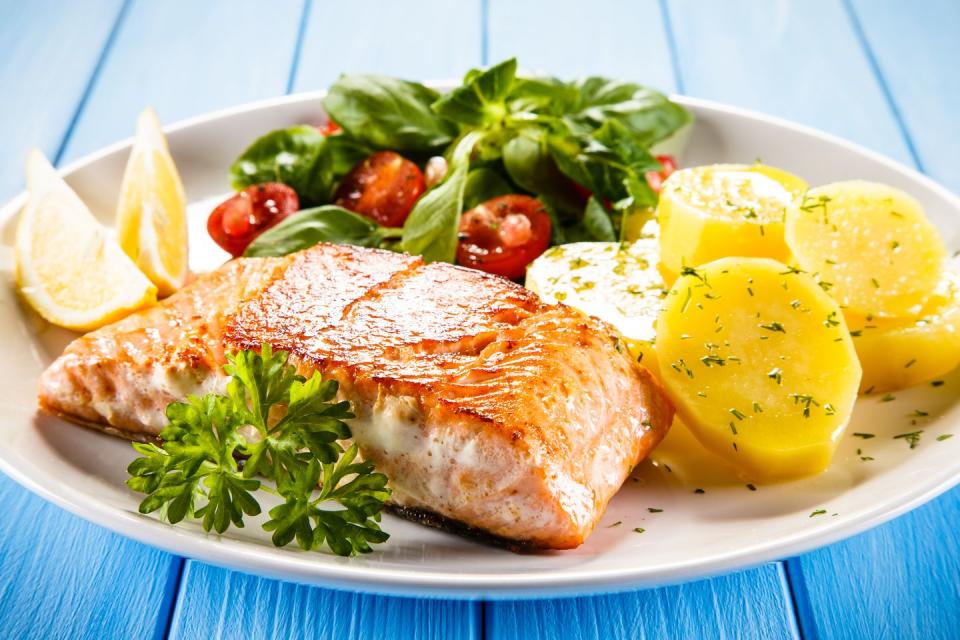This Video Will Forever Change How You Think About Calories

Figuring out how many calories you should eat is one of life's greatest mysteries — or so it seems. Although calorie needs depend on many factors such as age, gender and height, a general calorie range can help if you're looking to maintain or lose body weight.
Weight loss, health and body image are complex subjects — before deciding to go on a diet, we invite you gain a broader perspective by reading our exploration into the hazards of diet culture.
Let's Break Things Down
The amount of calories your body requires each day is based on your basal metabolic rate, along with your level of physical activity. And what exactly is basal metabolic rate, or resting metabolism? Essentially, it's the energy your body requires to perform all the activities vital for life, like respiration and digestion.
This rate accounts for about 70% of your total calorie needs, so it's pretty important to make sure you're fueling your body properly. The younger and taller you are, the higher your basal metabolic rate. Men also tend to have a higher resting metabolism than women.
When it comes to the remaining 30% of your daily caloric expenditure, it mostly comes down to your level of physical activity, which can vary from day to day. Basically, the more active you are, the higher your energy needs.
Eating the Recommended Amount of Calories
We asked America's top nutrition experts to weigh in to cut through the most common calorie misconceptions and help you identify what you really need each day.
"Many people think eating fewer calories is better when trying to lose weight," says Felicia Stoler, D.C.N., M.S., R.D., F.A.C.S.M., author of Living Skinny in Fat Genes. "However, unless you're a woman under 5-foot-3, I wouldn't recommend eating less than 1,600 calories per day." As Stoler points out, consuming too few calories can lead to a deficiency of essential nutrients and may even suppress the immune system.
"Eating less than your body needs can slow metabolism as the body begins to break down muscle for fuel," says Keri Gans, R.D.N., author of The Small Change Diet. "Without adequate calories, you may experience low energy levels, excess hunger or changes in mood," adds Lyssie Lakatos, R.D., C.D.N., C.F.T., author of The Nutrition Twins' Veggie Cure.
On the other hand, too many calories aren't ideal, either. In addition to weight gain and an increase in fat storage, consuming more calories than your body needs can result in a variety of less than pleasant ailments.
"Eating too many calories, especially from fried or spicy foods, can lead to gastric reflux," says Gans. "Those excess calories can result in feeling lethargic, weighed down and sluggish," adds Tammy Lakatos Shames, R.D., C.D.N., C.F.T.
Determining Your Caloric Intake Based on Activity Level
The perfect balance of calories will complement both your metabolic rate as well as your physical activity level.
Reaching Your Recommended Calorie Count
What does a typical daily meal plan look like within these calorie ranges? Let's take a look.
2,200 Calories Per Day
Breakfast: 2 scrambled eggs, 2 slices of 100% whole-grain toast, 1 tablespoon peanut or almond butter, 12-ounce latte with nonfat milk, 1 cup berries
Snack: 1 ounce of nuts (pistachios, peanuts, almonds, walnuts, etc.)
Lunch: 2 slices of 100% whole-grain toast, 3 ounces of chicken or turkey breast, 1 ounce cheddar cheese, 1 tablespoon mayonnaise, 2 cups tossed salad topped with ¼ avocado and 2 tablespoons vinaigrette dressing
Snack: 1 apple, 1 ounce part-skim cheese
Dinner: 5 ounce salmon filet, 2 cups broccoli sautéed in ½ tablespoon oil, ½ baked (sweet or regular) potato

1,800 Calories Per Day
Breakfast: 2 scrambled eggs, 1 slice of 100% whole-grain toast, 1 tablespoon peanut butter or almond butter, latte or café au lait with 8 ounces of non-fat milk, 1 cup berries
Snack: 1 ounce of nuts (pistachios, peanuts, almonds, walnuts, etc.)
Lunch: 2 slices of 100% whole-grain toast, 3 ounces of turkey breast, 1 tablespoon mayonnaise, 2 cups tossed salad topped with ¼ avocado, chopped walnuts and 1 ½ tablespoons vinaigrette dressing
Snack: 1 medium apple
Dinner: 4 ounce salmon filet, 2 cups steamed broccoli, ½ baked sweet potato
1,600 Calories Per Day
Breakfast: 2 scrambled eggs, 1 slice of 100% whole-grain toast, 1 tablespoon peanut or almond butter, latte or café au lait with 8 ounces non-fat milk
Snack: 1 ounce of nuts (pistachios, peanuts, almonds, walnuts, etc.)
Lunch: 2 slices of 100% whole-grain toast, 3 ounces of turkey breast, ¼ avocado, 2 cups tossed salad topped with 1 tablespoon vinaigrette dressing
Snack: 1 medium apple
Dinner: 4 ounce salmon filet, 2 cups steamed broccoli, ½ baked sweet potato
Be Mindful, But Don't Obsess Over Calories
Fixating on calorie counts can lead to deprivation and overeating if you aren't careful. Instead, focus on what you can eat in abundance, such as whole fruits and vegetables and the rest will fall into place.
The bottom line: Although watching your calorie intake is important if you're trying to maintain or lose body weight, it's not the only factor to focus on to ensure a healthy diet and lifestyle. "Instead of counting calories, focus on eating a diet rich in plant-based foods and whole grains," Stoler says. "Filling half your plate with vegetables at meals can help improve portion control," points out Gans.
You Might Also Like

